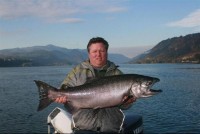Washington's Fish Consumption Rulemaking
Check out Riverkeeper's Q&A Fact Sheet on this issue
Despite being an environmental leader in many arenas, Washington State has some of the nation’s least protective limits on toxic pollution. Washington’s toxics water quality standards - the amount of pollution a state deems tolerable – simply allow too much toxic pollution. Many of our members are familiar with Oregon’s recent groundbreaking decision to adopt the nation’s most protective toxics water quality standards (i.e., the human health criteria for toxics). With strong leadership from many Tribes and the support of conservation groups, including Riverkeeper, Oregon ultimately spent over a decade revising its toxics standards to reflect—for the first time—the actual amount of fish eaten by many tribal members and other people in Oregon. The move came after studies on the Columbia River showed that tribal members eat drastically more fish than the state was accounting for when it determined how much toxic pollution in “tolerable” in our rivers.
So why hasn’t Washington State—a coastal state with some of the Northwest’s greatest rivers, including the Columbia—adopted accurate human health toxics standards? Last year, EPA, Riverkeeper, and a number of Tribes urged the state to make adopting new toxics standards a top priority. Now, Washington is taking the long-overdue, initial steps toward adopting new criteria. But the state’s plans still fall short.
First, the state is revising its Fish Consumption Rate—the state’s assumption about how much fish people eat per day. If the state assumes people eat a lot of fish, the Fish Consumption Rate is higher and, in turn, less toxic pollution is allowed. Conversely, if the state assumes people do not eat a lot of fish from local rivers and other waterbodies, the Fish Consumption Rate is lower and more toxic pollution is allowed. Adopting an accurate fish consumption rate is a critical step that needs to happen now.
Washington’s Department of Ecology announced a schedule for beginning the process of revising the human health toxics water quality standards. Shockingly, the state won’t begin the process until late 2012—at the earliest. In the meantime, Ecology plans to adopt new rules designed to make it easier for polluters to comply with the as-yet-unadopted new standards (called “regulatory flexibility” rules). Something smells fishy here. What if the new toxics limits never get adopted? After decades of failing to protect the many people who eat local fish, why is Ecology piling on more delay?
Riverkeeper teamed with the Northwest Environmental Advocates to engage water quality groups around the state about this serious problem. This week, we sent a strong letter —joined by 17 other Washington organizations—to the Director of Ecology asking for an end to the delay, and a new approach to the disparate timeline for “regulatory flexibility” rules and new toxics limits.
We need your help.
Please send an email to the Director of Ecology, Ted Sturdevant, telling Ecology that:
- You support the conservation groups’ letter urging the state to drop its two-step rulemaking plan that gives flexibility to polluters before ensuring real reductions in toxic pollution.
- Washington State has dragged its feet long enough on revising the toxics water quality standards. As someone who cares about rivers and public health, you want action now.
For more information, contact Riverkeeper’s Staff Attorney at lauren@columbiariverkeeper.org.



